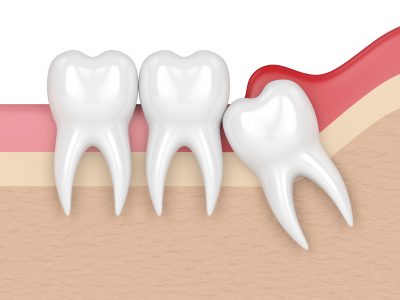
3d render of wisdom mesial impaction with pericoronitis. Concept of different types of wisdom teeth problems.
Wisdom teeth are undoubtedly the most troublesome teeth we have. They are our third set of molars and are the last ones to come through, usually when we are in our late teens, early 20s or even older. It’s very common for there to be insufficient room in our mouths for our wisdom teeth, which is why they are so prone to becoming stuck, or impacted.
Symptoms of Impacted Wisdom Teeth
Wisdom tooth pain can be quite intense, and is typically a throbbing and/or pressure at the back of the mouth or jaw, along with swollen, tender gums. Ear pain, jaw pain, sore throats and headaches can all be caused by impacted wisdom teeth, as can persistent bad breath.
Major problems can result when the tooth becomes stuck, or impacted due to a lack of space for it to come through the gum normally. A partially erupted wisdom tooth is where it has not come through the gum fully, and this makes it more prone to bacterial infections or cysts. The back of your mouth is already an area that is harder to keep clean, and partially emerged wisdom teeth can be a magnet for bacteria which cause gum disease and infections. Symptoms of an infected wisdom tooth include pain and swelling at the infection site, bleeding and tender gums, swollen lymph glands, difficulty swallowing and fever.
Because so many wisdom teeth come in crooked, they also affect the alignment of your teeth and bite by putting pressure on neighbouring teeth.
Wisdom Teeth Removal
Wisdom teeth removal begins with an appointment with your dentist, who will examine the area and take x-rays to determine if the tooth is impacted and how it is sitting in your jaw. In many cases wisdom teeth removal can be performed by your dentist safely, painlessly and quickly using local anaesthetic, just like a regular tooth extraction. Recovery usually takes a few days where you will need to avoid eating on the extraction side of your mouth, avoid hot foods and beverages, and may require a standard course of antibiotics to guard against infection.
Dental sedation can be a good option if you suffer from dental anxiety, or if you are having more than one tooth removed. It ensures that even the most nervous of patients can stay calm and comfortable throughout the procedure. McIntosh Dental are experienced and qualified in sedation dentistry and offer oral sedation, nitrous oxide and IV sedation options.
Oral surgery by a specialist oral surgeon may be necessary for complicated wisdom teeth removal, such as where an incision in the gum tissue is necessary to expose the tooth and surrounding bone. For these types of cases, McIntosh Dental’s oral and maxillofacial surgeon can complete the oral surgery procedure at our clinic in Lincoln Road.
If you are concerned about your wisdom teeth, please contact us for a consultation. We can assess your wisdom teeth and recommend the best course of treatment.
